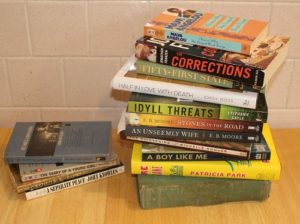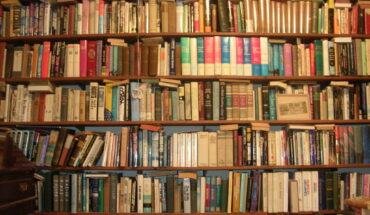 Standard advice to novelists is to read a lot. Of course, it would be ironic to find a writer who does not like to read. It’s the “a lot” where I get hung up. Unlike many of my writing colleagues, I was not an avid childhood reader. When I was older, my mother told me I was able to read before I started kindergarten. She also told me that she read to me regularly. I don’t dispute either of these things; I just don’t remember them.
Standard advice to novelists is to read a lot. Of course, it would be ironic to find a writer who does not like to read. It’s the “a lot” where I get hung up. Unlike many of my writing colleagues, I was not an avid childhood reader. When I was older, my mother told me I was able to read before I started kindergarten. She also told me that she read to me regularly. I don’t dispute either of these things; I just don’t remember them.
What I do remember is inventing worlds, outdoors with Freddy, my younger next door neighbor, or with Mimi, from down the street, and our giant teddy bear collection. When I wasn’t playing with other children, I was creating the equivalent of storyboards, telling my tales out loud as I drew with pencil on small pads of paper or manipulated fuzzy felt figures on a black background. I liked Babar, Winnie-the-Pooh, Impunity Jane by Rumor Godden (I think it was the word “impunity”), and the Bobsey Twins, but mostly I liked to invent stories.
Later, my somewhat demanding Quaker secondary school required us to read at least three books a quarter and five in the summer for a minimum total of 17 per year, in addition to those that were assigned as a part of our curriculum. As an ambitious student, I read more than the minimum. But as a slow reader, that insufferable requirement was a burden at best and torture at worst. Not that I didn’t love some novels from that period—To Kill a Mockingbird, Catcher in the Rye, A Tree Grows in Brooklyn, A Separate Peace, The Heart is a Lonely Hunter–come to mind. During that period, I barely did any art, the imaginative games of childhood were behind me, and only once did a teacher assign the writing of a short story (my favorite assignment!). Despite it all, I liked school and am grateful for the rigorous training I received in writing a coherent paper, learning the rules of grammar, developing a solid vocabulary (thank you Word Wealth), and yes, even for the opportunity to read so many good books.
It wasn’t until I was out of college a few years that I actually began to enjoy reading for its own sake. But I am still a plodder, with a poor memory for what I read (though a good memory for other sorts of things.) A few days away from a novel, and I’ve lost the whole thread of it, needing to retrace my steps before continuing. A week after I’ve finished it, I’ve forgotten all but the bare bones, even when I’ve loved it at the time. My father, a brilliant man with a Ph.D. in physics, read a great deal and complained of the same phenomenon. “Memory is a very under-rated faculty,” he would say. As he aged, he took to opening James Joyce Ulysses (his favorite book) at random and reading a few pages rather than attempting anything new that wouldn’t stay with him.
The reasons offered for writers reading are several: 1) familiarity with and understanding of the elements of storytelling—character development, dialogue, structure, plot, theme, style, POV, conflict, etc.; 2) use of language and ways of expressing oneself; 3) vocabulary-building; 4) exposure to other viewpoints, lifestyles, cultures; situations; 5) familiarity with the characteristics or tricks of the trade of the genre in which one writes or wants to write, and 6) inspiration, among others. I would also add that reading a lot might help the writer spot those all important “comp” books that make it easier for agents and editors to peg where one’s novel belongs in relation to already published works (assuming that you remember what you read!)
But just reading a lot is no guarantee that any of these things will happen just through osmosis. What is more important, I believe, is mindful reading of a variety of authors. Mindful reading comes from thinking about and analyzing the ways in which the author uses the various elements and tools of fiction (successfully or unsuccessfully) to tell the story, learn about the characters, and keep us engaged. That process may take a second or third reading to accomplish, and that may mean that we have time to read fewer books.
I don’t think anyone would argue that reading, even mindful reading, provides sufficient training for the budding novelist. Certainly, thoughtful instruction in writing novel-length fiction, opportunities to critique and be critiqued, and watching/listening to other forms of storytelling (movies, television, plays, story slams, podcasts) all help to advance one’s craft. Less obvious but no less important, especially for inspiration, is to actively participate in life in all its myriad forms. I recall a very young woman in a writing class I took decades ago at the Cambridge Center for Adult Education. Her first story was enviably gorgeous; her second story was equally gorgeous, but it was almost exactly the same as the first. She confessed to not having anything to write about. In short, she hadn’t lived yet, and I guess was not at ease with her own imagination.
Perhaps I have committed a sacrilege with my confession or destroyed my chances with certain agents who might chance to read this piece. Maybe I’m just trying to justify my own pitiful reading habits. But is reading any less or more of an escape from working on that next novel draft than binge-watching “Girls,” going on a protest march, painting a still life, or even organizing one’s sock drawer? And can’t each of these choices provide a potential opportunity to enrich our writer’s brains with new observations if we care to use them in that way? Meanwhile, I am on the lookout for my own Ulysses.
Author’s note: I confess to having read and enjoyed all the books in the accompanying photo with the exception of Ulysses—sorry, Dad. I am also shamelessly promoting some works from my Novel Incubator colleagues.


9 comments